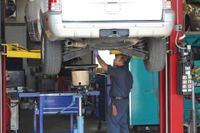3 Things You Need to Know About Driving With a Diesel Engine

Originally known for noise and odor, the diesel engine has evolved to become a highly efficient vehicle option. If you recently purchased a car or truck with a diesel engine for the first time, there are some differences between it and gasoline engines you need to know about. The more you learn about this auto part, the fewer visits you will make to the local engine and transmission maintenance shop for emergency repairs.
New to Diesel Engine Driving? Keep These 3 Factors in Mind
1. Filter Cleaning & Oil Changes Are Crucial
Diesel engines do not burn fuel as cleanly as their gas counterparts, causing their fuel filters to clog more easily. Most modern diesel engines feature two fuel filters to help combat this issue. Check both filters every 10,000 to 15,000 miles as well as your air filters. How often these filters require cleaning depends on your location; for example, if you reside in a city, you need to clean the filters more often than if you live in a rural area with cleaner air.
 Routine oil changes are also essential to diesel engine efficiency. The part burns the oil used to keep it lubricated during operation, making it important to check the oil level and cleanliness about every 5,000 miles. Check it more often if you drive your vehicle every day, such as every 3,000 miles.
Routine oil changes are also essential to diesel engine efficiency. The part burns the oil used to keep it lubricated during operation, making it important to check the oil level and cleanliness about every 5,000 miles. Check it more often if you drive your vehicle every day, such as every 3,000 miles.
2. Diesel Engines Don’t Do Well in Cold Weather
Your diesel engine relies on glow plugs rather than spark plugs that warm the inside of the part’s thick cylinder when you start your car instead of igniting a fuel-air mixture. It subsequently uses a block heater, or external heat source, to compress the fuel-air mixture for combustion. Use this block heater to keep the engine warm when temperatures drop below -10 degrees Fahrenheit to prevent harsh starts, slow warm-ups, and engine failures that can result in trips to your local engine and transmission maintenance center. Plug-in block heaters are easy to use and hook up to residential and RV camp electricity sources easily.
3. You May Need to Remove Water From the Fuel System
Unlike gasoline, diesel fuel contains water. Most modern engines feature water/fuel separators to prevent part damage; however, if your vehicle is an older model, you may need to remove the liquid manually. Refer to your owner’s manual for purge instructions, including how often you should remove the water. Many campgrounds and gas stations also provide this service.
Keep your diesel-powered vehicle in great condition with assistance from Friendly Transmission Service in High Point, NC. The transmission maintenance and repair center has served the region since 1986 and provides same-day service whenever possible. Call (336) 882-1164 today to make an appointment with the transmission maintenance center, or visit the website for more information about diesel services.
About the Business
(148 reviews)
Have a question? Ask the experts!
Send your question

